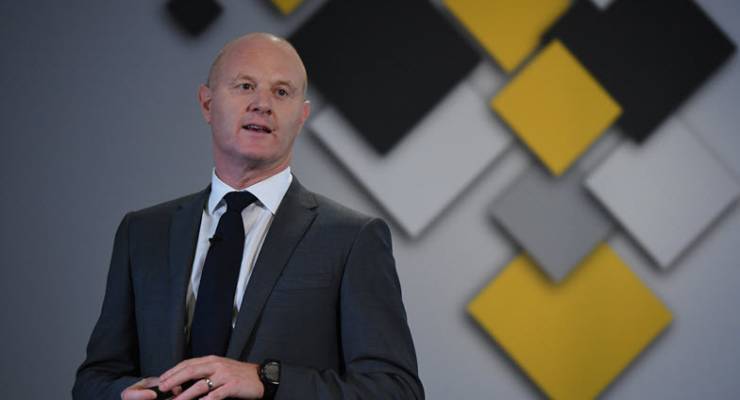
Commonwealth Bank of Australia CEO Ian Narev
Are you partying like it’s 2010? Because sovereign risk is back, people, big time. We haven’t seen “sovereign risk” (or, as ordinary people call it, democracy) invoked so much since Labor’s mining tax, which was supposedly going to bring the mining boom to a crunching halt as investors fled to Zambia, Ghana and Mozambique.
Today, The Australian Financial Review, or as we know it, the Sovereign Risk Times, carried a warning from Commonwealth Bank head Ian Narev that sovereign risk is increasing “exponentially” in Australia (yes, that fast!) and worried investors now viewed the country as an uncertain investment environment. All over one perfectly sensible bank tax, and a second not-so-sensible and much smaller one — like most spin-offs, South Australia’s bank tax is a dud and getting bad reviews, although the way the banks are carrying on, you’d think it was Joanie Loves Chachi.
Those “sovereign risk” sentiments chime with those of mining giant Glencore, which at the end of May warned “the investment environment in Australia has materially changed” and that uncertainty, including uncertainty about energy suppliers, might force it to leave Australia.
Fortunately, some investors are still prepared to invest in Australian assets in the energy and resources sector. Rio Tinto is currently enjoying a bidding war for its New South Wales coal mines. It fielded an early offer from Chinese giant Yancoal, but there’s another giant that has entered and turned the sale into an auction, plainly unconcerned about the lack of certainty in Australia. And that’s … Glencore.
See, Rio wants out of coal (plainly it doesn’t share the optimism of the government about coal’s major role in the of Australia and humanity in general). Chinese group Yancoal made an offer for the assets a few months ago with a staged payment system totalling US$2.45 billion. Just over two weeks ago, Glencore popped up with an offer of its own of US$2.55 billion. Rio thought about that bid and then knocked it back, claiming the Yancoal bid offered more certainty (Rio’s biggest shareholder is Chinese aluminum company, Chinalco, Rio sold the Simandou iron ore project in Guinea to Chinalco, and it has the Stern Hu debacle in the background of its dealings with China — in other words, Rio is very sensitive about alienating China).
But on Friday night, Glencore upped its offer to US$2.67 billion (over A$3.5 billion) all paid upfront. And to sweeten the deal further, Glencore said it would pay Rio $US225 million if the deal was blocked by regulators here or overseas. Yancoal has only offered US$22 million. Rio is currently thinking about the offer.
As usual when it comes to cries of “sovereign risk”, it pays to ignore the bleating of companies — especially mining companies — and keep an eye on where the money is going.








Glencore has been flogging off assets for years. They have no idea how mine development works as I found out when one of my kids worked for them in the Isa. Theyn start by retrenching staff whose impact is long term, quality control etc. The sooner this collection of tax dodging carpet baggers have left the better we will be.
My favourite Australian Financial Revue was their attempt at “The Book of Moron”.
The SA bank tax is so awful, it has stopped 150 new jobs from being offered there, ha ha! Since when are banks employing?
Given that many people already detest the banks and their massive profits, I can’t see Bank SA’s “no new jobs” line garnering much public support.
You’re in a hole, stop digging…the public already think you’re a mob of entitled, money grasping pricks. Your threatened investment strike confirms it.
How much money do banks have to spend on advertising after one of their highly paid decision-makers is caught overstepping the bounds of common decency, in pursuit of easy dollars?
….. Was Glencore planning on taking it’s mines off-shore with it?